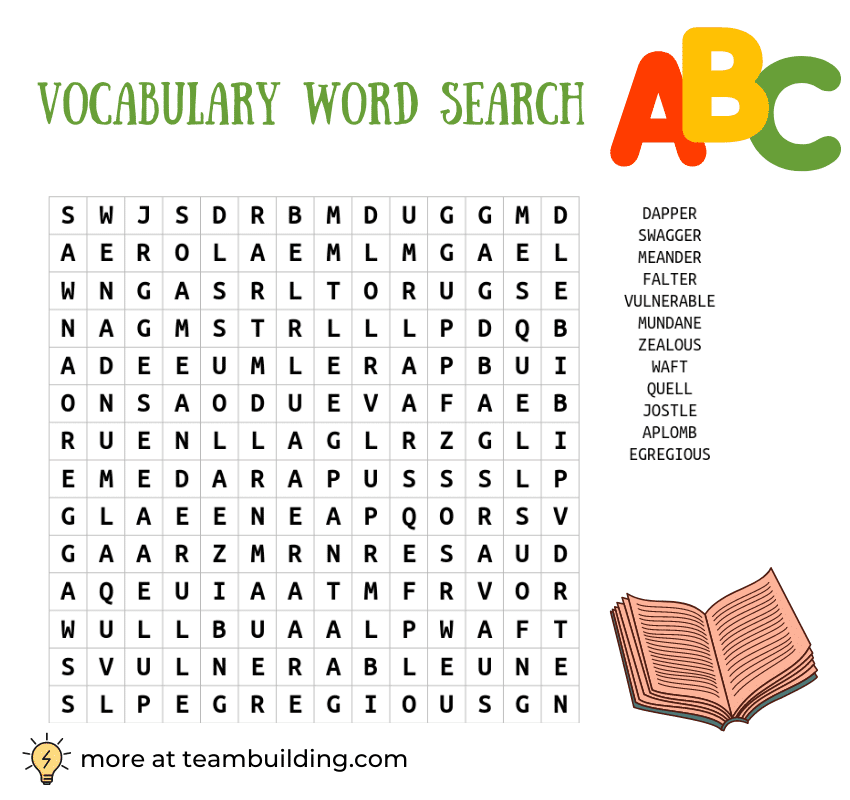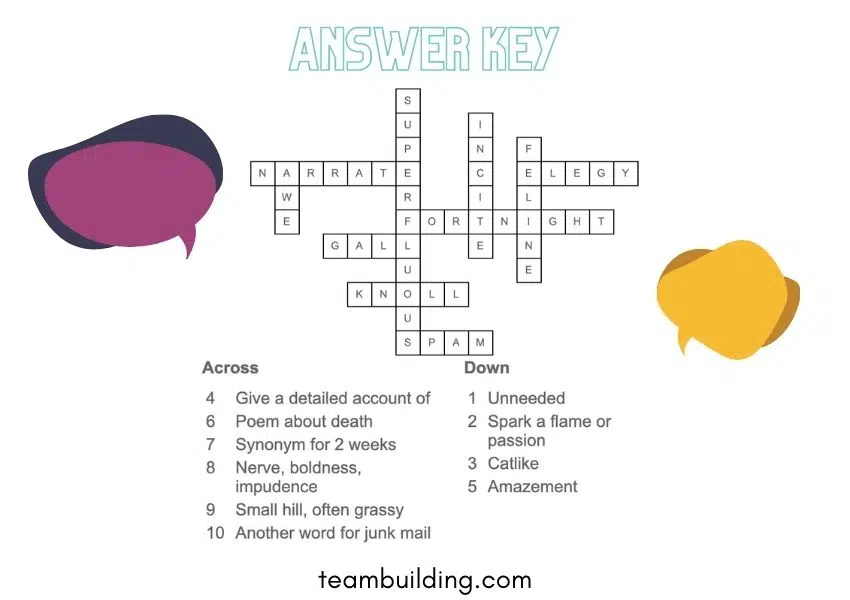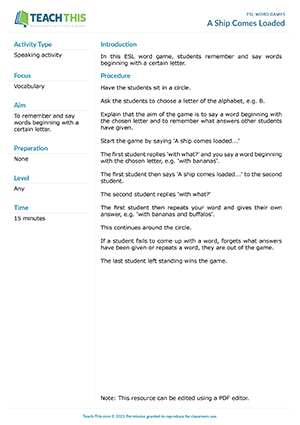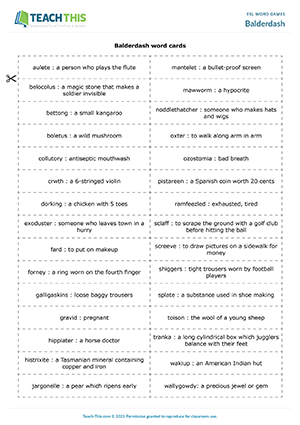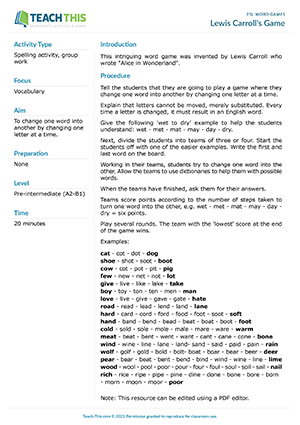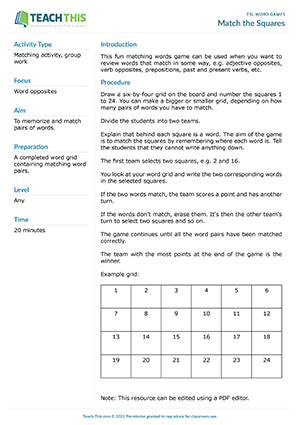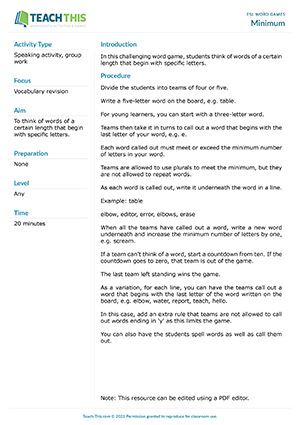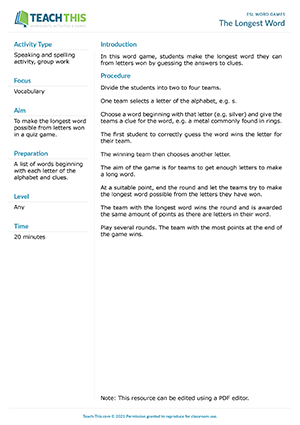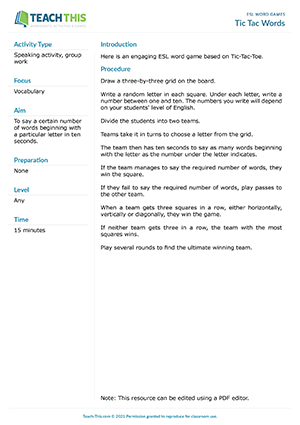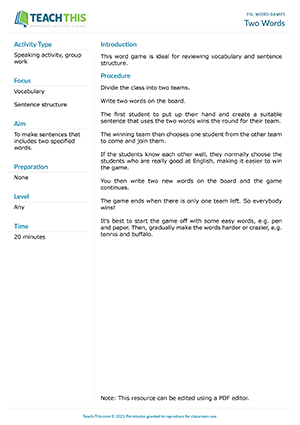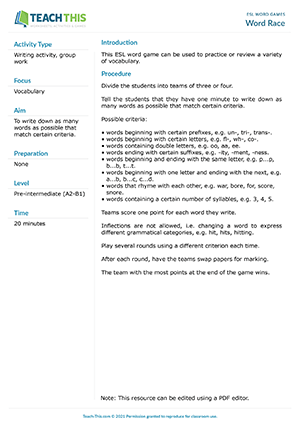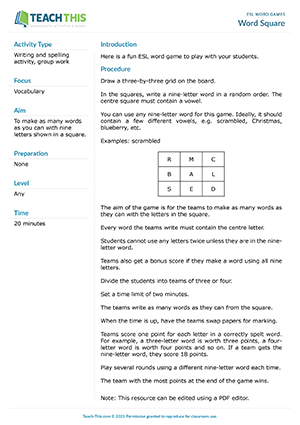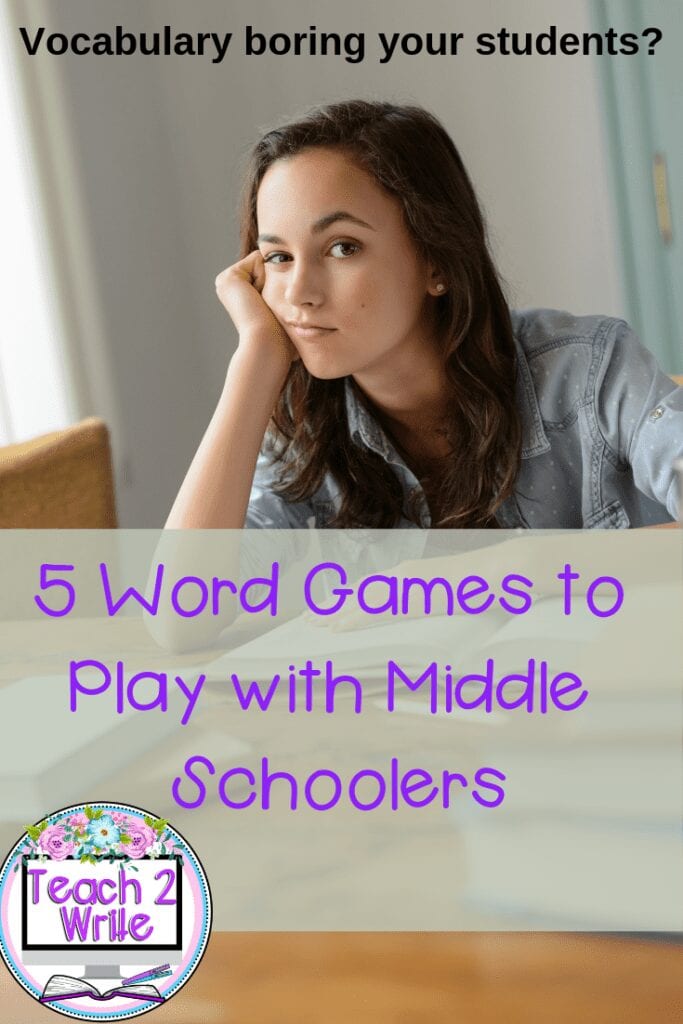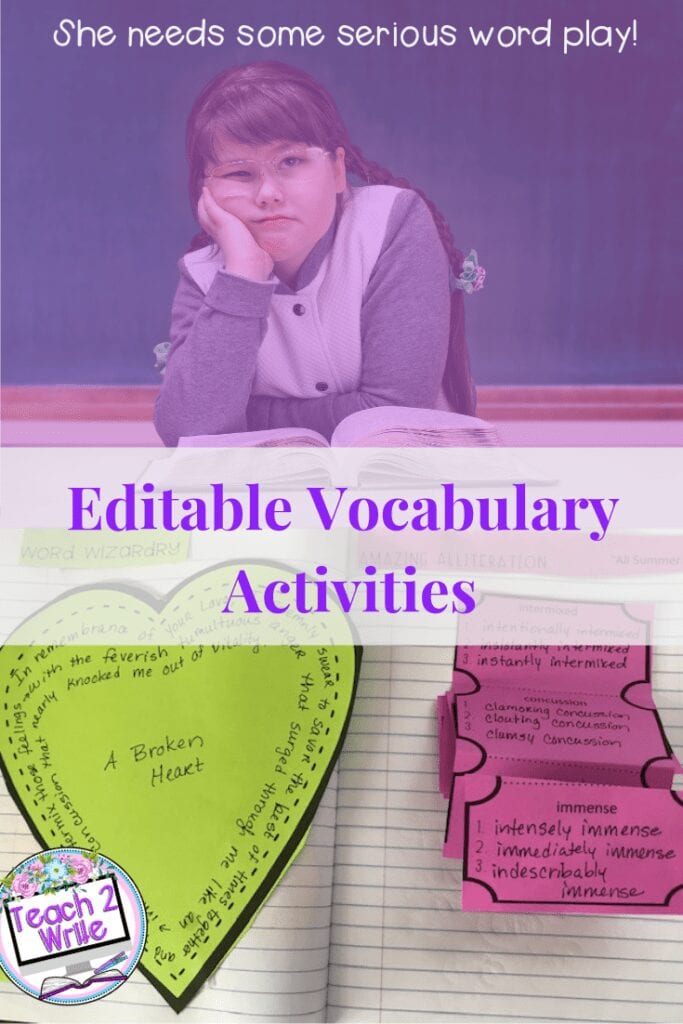The acquisition of new vocabulary is essential in terms of overall language advancement. However, there is always a need to review active words from time to time in order to use them fluently in speech. Here, we will present a couple of great vocabulary revision games which will perk up every classroom. Through these games the learners will feel how fun, entertaining and effective the learning process can be.
1. Charades
Charades is a fun and cool revision game. Students need to practice their acting skills to explain the words. This game is extremely easy to organize with minimal advance preparation. The only thing to be ready for is to keep a collection of vocabulary cards for the words you have studied.
The class is divided into two teams. Each team member takes turns acting out one of the words from the vocabulary set and explains it by acting out the word. If his or her own team can’t guess the word, the opposite team gets the chance to guess it. Each right answer equals one point.
Skyeng ищет преподавателей английского. Подробности по ссылке: Skyeng
2. Pictionary
Pictionary is also an entertaining game to play for vocabulary review. The rules are similar to those of charades except that instead of acting out the word, it is drawn on the board.
3. Bingo
Bingo can serve as a good revision game. From my experience, most of the groups/students like playing bingo because it gives them the chance to reflect on the words they have digested.
Students are given a blank bingo board and are asked to put the review words into the squares randomly. The teacher puts the active words in a hat or a box, takes them out one by one and defines them. If the student has a word corresponding to the definition, he crosses it out on his bingo board. When someone gets five squares in a row, they should shout, “Bingo!”
Check these articles out as well:
4. A memory style
A memory style card game can be another effective way for reviewing vocabulary. It requires some preparation before the game starts. For each word to be reviewed, one card should have the target vocabulary word and another card should have the definition of the word. You also need to have a big playing grid where you put the words and their definitions face down.
Each person turns over two cards each turn trying to find a match. If the cards do not match, he turns them over again and the next person tries to find a match. If he succeeds, he keeps the cards and gets an additional turn. The player with the highest number of cards at the end of the game wins.
The game can be modified even further. If you have accumulated enough synonyms or antonyms to the target vocabulary, you can practice matching target words to their antonyms or synonyms.
5. Categories
Categories is another awesome revision game which will make students energized and empowered. What they need for the game is to draw 4-6 columns on their paper and write a category at the top of each column. Categories fit the topics covered during the course. For example, if you have covered the business topics of Marketing, Work and Leisure, Ethics, Human Resources, Travel, you write these topics as categories.
You time the students and ask them to write as many words as possible under each category. As a further modification, choose a random letter and write it on the board. Give students enough time to write down a word for each category that starts with that letter.
Экономьте время на подготовку к урокам и проверку домашних заданий со Skyeng. Удаленный формат занятий, защита от внезапных отмен и график, который настроен специально под вас. Присоединяйтесь к нашей команде. Подробности по ссылке: Skyeng
6. Letter scramble
Letter scramble will make students really competitive and super fast. What you need is to take a list of words that your students have recently learned and write a scrambled version of each on the board. Students need to unscramble the words on their paper. The first one to finish deciphering all the words wins.
7. Stop the bus
Stop the bus is a cool game my students adore. I usually divide the class into 2-3 teams. One student from each team. This student sits on a chair facing his peers. Then from behind the student in the hot seat, show the other students a word from the lesson. The other students must try to describe what the word is without saying the actual word. And the student in the hot seat must guess.
The student who guesses the word shouts out “stop the bus” and checks the word with the teacher. If correct, the team gets a point. If wrong, other teams have the chance to guess the word by writing their versions on a piece of paper and passing the papers to the teacher.
8. Puzzles
Puzzles is another cool and easy tool to review the material in an effective way. What I like about this way of vocabulary revision is that students can work in pairs or groups while trying to find words matching the definition in the crosswords. They learn by listening to each other, cooperating to find the right answer. In this way, they both review the material and improve their teamwork skills.
Follow this link to get templates of different types of puzzles.
We also recommend watching a video with Alexei Konobeev. The speaker shared games to help your students remember new vocabulary. These games do not require special training and you can adapt them to any age and level.
We hope that all these games would serve their best to liven your vocabulary revision sessions and make them more meaningful and effective.
Which of these games have you tried? Which ones have you picked up for your next revision slot?
You found our list of fun and simple vocabulary games for adults.
Vocabulary games are activities that include language and wordplay. Example games include Word Association and Hang Man. Players can enjoy vocabulary games in person or online. The purpose of these games is to strengthen vocabulary skills. These games are also known as “vocab games”, “letter games” and “vocabulary building games.”
These games make great online classroom activities and communication games, and can be used as online fun activities for employees.
This list includes:
- vocabulary games for adults
- simple vocabulary word games for adults
- fun online vocabulary games and activities
- English vocabulary games
- vocabulary games in English
- games to improve vocabulary
- vocabulary building activities
- vocab review games
- vocabulary games for students
Get ready to play!
List of vocabulary games
From Pictionary to word scrambles to synonym memory, here is a list of fun word games to play in classrooms, at parties, or during meetings.
1. Vocabulary Pictionary
Pictionary is a game of charades where players draw words instead of acting them out.
To play:
- Split the group into teams.
- Each round, assign one team member to draw.
- Give the drawing team member a word.
- Allow up to sixty seconds for teammates to guess.
- If the team guesses correctly, then assign one point.
You can give other teams the opportunity to steal, or move onto the next team’s turn. The game is a great way to practice new vocabulary, as players connect the word with an image. Pictionary is a fun game for virtual parties or in-person affairs.
To play Pictionary online, draw on the whiteboard app feature on your online meeting software.
2. Word Association
Word Association is one of the best vocabulary games for kids and classrooms since playing does not require a large vocabulary. The rules are simple and easy to understand. Typically, the game involves two players.
To play:
- Player one says a word.
- Player two responds with the first word that comes to mind.
- Player one either chooses a new word or responds to player two’s word.
- The game continues until one player repeats a word or pauses too long.
The rapid pace of the game generates excitement and occasionally results in funny answers.
If a student makes a mistake, then the teacher can pause the game and ask the student to explain or find a more fitting word. Ideally, gamemasters should allow players a few extra seconds to respond. Players should never feel embarrassed. There are no wrong answers in word association, but the game can serve as a learning opportunity to find better words.
If playing via Zoom, then player one or the teacher speaks a word, and other students answer in the chat. The class counts up matching answers and discusses different responses, guessing the reasoning behind each answer.
3. Vocabulary Hangman
Hangman is a classic chalkboard word game that translates easily to online play, thanks to digital whiteboards.
To play:
- Assign a player a word.
- The player draws a series of blanks corresponding to the number of letters in the word.
- Other players guess letters.
- If the letter is in the word, then the “executioner” fills in the blank. If not, then the executioner draws one portion of the gallows.
- The game ends when players guess the word, or when the picture is complete.
The best words to use for hangman contain less-used letters like z, x, and q. Examples of hard hangman words include zigzagging, razzmatazz, and quadrants.
4. Word search
Word searches are common classroom vocabulary games. These activities work well for handouts, and you can play during video calls by using the whiteboard feature and enabling annotation.
We made a sample word search you can use.
To make the game more competitive and exciting, turn the challenge into a race and award prizes to the first players to complete the puzzles.
5. Crossword
Crossword puzzles consist of a series of interconnecting boxes, each of which starts blank but contains one letter by the end of the game. Under the puzzle are two lists of clues, across and down respectively. Solvers need to consider the meaning of words, number of letters, and surrounding words, making the game strategic as well as literary.
Here is an example of a crossword puzzle you can use with your class or team.
Here is the answer key.
Crosswords are great word games for any age or skill level because puzzle makers can adjust the difficulty to suit players. To make your own crossword puzzle, use an online crossword creator.
6. Word Scramble
Word scrambles make great games for English class, and adults enjoy these language brain teasers as well. Simply mix up the order of the letters and ask players to unscramble and identify the original words.
Here is a sample to start with.
And here is the answer key.
To make your own word scrambles, use an online letter randomizer.
7. Scrabble
Scrabble is one of the most popular word games for adults or children. Players must use letter tiles to assemble words on the game board.
To play:
- Each player draws seven letter tiles.
- During turns, players can play tiles or exchange them for new letters.
- Players build words on the board, with each new word connecting to an existing word.
- Tiles have a point value assigned depending on the challenge of the letter. When a player makes a word, tally the letter and add the score to the point board.
More challenging letters have higher point values. For example, E is one point, while Z is ten. To find the point values for each tile and read more gameplay tips, check out this guide from Hasbro.
To coordinate the game for language lessons, assign higher scores for vocabulary words, and ask players to use the words in a sentence for extra points.
Scrabble is easy to play online, too, making it one of the best online vocabulary games. To play virtually, simply find a multiplayer online version of the game, such as Words With Friends.
8. Scattergories
Scattergories is one of the most fun and simple word games for adults. The game challenges players to think up words all starting with the same letter.
To play:
- One player rolls a letter die or uses a letter generator to pick the first letter.
- The timekeeper puts 60 seconds on the clock.
- Players write down one answer per category starting with the letter.
- When time runs out, players read the answers.
- Players receive a point for every answer.
Alliterative phrases count for double or triple points. If two players have the same answer, then they must cross it out and neither receives points. Of course, a player will not receive points for blank answers either. At the end of each round, the player with the most points wins.
Here is a list of sample Scattergories categories:
- A boy’s name, girl’s name, or gender neutral name
- Capital cities
- Four letter words
- Types of drinks
- Holidays
- Careers or professions
- Cartoon characters
- Websites
- Desserts
You could create more inventive categories for the game, or challenge players to make up prompts.
To play virtually, use the chat, screen-share, whiteboard functions in your virtual meeting platform. You can also share a Google Doc or Form, or join a multiplayer online Scattergories game together.
9. Tree or Bob Ross
Tree or Bob Ross is a fun video conference game that challenges players to guess a word by asking questions.
The player who conjures the word is The Post. The Post answers This or That questions whose answers help players narrow down the word.
The first question of the game is usually “is it more like a tree, or more like Bob Ross?” and The Post must answer accordingly. For instance, a rose is probably more like a tree, but Pinnochio presents an interesting challenge.
Each turn, the guesser adds a new word. For example, the second question might be, “is it more like a tree or a fern?” The game continues until players guess correctly. For more excitement, introduce a time limit, or award more points if players guess the word during earlier rounds.
10. Vocabulary Pyramid
Pyramid challenges players to guess words from context clues. The pyramid is a collection of six words, arranged with three on the bottom, two in the middle, and one at the top. To win, teams must guess all words within the pyramid in the allotted time.
To play:
- Divide the group into teams.
- Give one player on each team the pyramid.
- The pyramid holder must give hints to teammates describing each word without using the actual name of the item.
- When players guess correctly, the pyramid master can move to the next word. Or, players can say “pass,” and return to the word later.
- Teams receive a point for every correct guess.
When determining the time limit, consider the age of your players and the difficulty of the words. In general, 30 seconds per word, or three minutes total, is a good place to start, but add or take away time to increase or decrease the challenge.
11. Invisible Bridge
Invisible Bridge is similar to six degrees of Kevin Bacon. In both games, you must figure out a way to connect two seemingly distant concepts. Six degrees of Kevin Bacon uses actors, while Invisible Bridge uses words.
To play:
- A player suggests two unrelated words.
- Player one gives a number of planks. This is how many steps other players must use to relate the two words.
- The other players think up words that share similar traits, synonyms, or connector words to move from one term to another.
An example round might look as follows:
Tiger, Astronaut, eight planks
Tiger – Balm – Lip – Service – Customer – Happy – Pills – Capsules – Space – Astronaut
Meanwhile, Tiger, Astronaut, two planks might look like this:
Tiger – meat eater – meteor – Astronaut
One fun aspect about this game is there can be more than one correct answer, and opposing teams can dispute far-reaches. Invisible bridge encourages players to think about the nature of language and the relationship between words.
12. Poetry Improv
Poetry Improv is an exercise that challenges participants to craft verses on the spot.
To play:
- Pick a poetry style, such as sonnet, haiku, acrostic, limerick, or free verse.
- Give participants vocabulary words to use within the poem.
- Allow five or ten minutes for groups or individuals to complete the verses. If playing online via meeting software, then send groups to breakout rooms to work.
- Ask poets to share the masterpieces aloud.
For extra fun, turn other players into judges by asking them to rate the poems by holding up scorecards. To make the game more fast-paced, ask players to finish each others’ phrases on the spot for a true poetic improv.
13. Synonym Memory
The rules of Memory are easy: flip over two cards at a time and look for matching pictures or words. When players find pairs, they take the cards off the board. The player with the most pairs of cards at the end of the game wins.
Synonym Memory puts a challenging spin on the simple game. Instead of hunting for exact matches, players pair up words with synonyms.
Here are some sample matches:
- enticing/tempting
- assume/suppose
- patience/restraint
- revoke/rescind
- impact/collision
The game encourages players to think in different ways, as participants will need to remember the location of the cards as well as consider meanings of words.
To play online, make your own virtual synonym memory game with an online tool and share screens to play, with one player flipping over the cards at other players’ request.
List of words to use for vocabulary games
Here is a list of great words to use in word games:
- serendipity
- fortitude
- akimbo
- sumptuous
- ineffable
- zephyr
- incorrigible
- medallion
- mauve
- bombast
- denouement
- contemporary
- gossamer
- inane
- hippodrome
- concession
- ideology
- quintessential
- prescient
- regurgitate
- gnash
- cataclysmic
- knell
For further inspiration, use a random word generator or consult online lists of difficult or intersecting words.
Conclusion
Vocabulary games and activities test and strengthen players’ communication skills. These word games minimize frustration by disguising language lessons in the form of an exciting challenge. Not to mention, simple word games are fun for adults and kids alike, and make great icebreaker activities during meetings. Most games only require words and a way to share them, so playing word games online via Zoom or similar platforms is easy.
For even more smart fun, check out our posts on problem solving games, question games and team building brain teasers.
FAQ: Vocabulary Games
Here are answers to common questions about vocabulary games and activities.
What are vocabulary games?
Vocabulary games are word and language games you can play with students, coworkers, or family and friends. These games challenge players to hunt for words or definitions, brainstorm terms, deduce phrases based on clues, or create words under certain conditions. Language games are a great way to teach new vocabulary and help students practice recognizing and using new words. These activities are also known as “vocabulary building games” and “vocab games”, and are similar to “word games” and “letter games”.
What are some fun word games for groups?
Some fun word games for groups include Pictionary, Tree or Bob Ross, and word scrambles.
What are some online vocabulary games?
By using virtual meeting software like Zoom, you can play any word game online. Some good virtual vocabulary games include Scrabble, Scattergories, and online crossword puzzles.
What are good ESL word games?
The best ESL word games are easy to understand and play yet expand the vocabularies of participants. Good ESL word games include word association, word searches, and hangman.
What are fun ways to teach vocabulary?
Word games are one of the most fun and easy ways to teach vocabulary. While some kids get frustrated with straightforward reading or language exercises, word games disguise vocabulary lessons as a fun challenge. Plus, playing language games together is a great teamwork exercise.
A Ship Comes Loaded
ESL Word Game — Vocabulary and Speaking: Memorisation, Forming Words from Prompts — Any Level — 15 minutes
In this ESL word game, students remember and say words beginning with a certain letter. Have the students sit in a circle. Ask the students to choose a letter of the alphabet, e.g. B. Explain that the aim of the game is to say a word beginning with the chosen letter and to remember what answers other students have given. Start the game by saying ‘A ship comes loaded…’ The first student replies ‘with what?’, and you say a word beginning with the chosen letter, e.g. ‘with bananas’. The first student then says ‘A ship comes loaded…’ to the second student. The second student replies ‘with what?’ The first student then repeats your word and gives their own answer, e.g. ‘with bananas and bears’. This continues around the circle. If a student fails to come up with a word, forgets what answers have been given or repeats a word, they are out of the game. The last student left standing wins the game.
Balderdash
ESL Defining Words Game — Vocabulary and Writing: Writing Definitions, True or False, Guessing — Group Work — Upper-intermediate (B2) — 25 minutes
This ESL word game is based on a popular board game of the same name. In the game, students invent false definitions for words and score points by correctly guessing true definitions. Give each group a set of balderdash word cards. The leader of the round chooses one of their word cards, reads the word aloud and spells it. The other students then each invent a short false definition for the word that could fool the other group members and write it on a slip of paper. The leader also copies the true definition onto a slip of paper. Each student then hands their definition to the leader who mixes them up and then reads each one aloud. The other students then vote on which definition they think is correct and the leader reveals the answer. Students score one point for each vote their false definition receives and two points for choosing the correct definition. The leader scores three points if nobody chooses the correct definition. The scores are added up and another student becomes the new leader and so on. The student with the most points at the end of the game wins.
Lewis Carroll’s Game
ESL Word Game — Vocabulary and Spelling: Forming Words from Prompts — Group Work — Pre-intermediate (A2-B1) — 20 minutes
This intriguing word game was invented by Lewis Carroll who wrote «Alice in Wonderland». Tell the students that they are going to play a game where they change one word into another by changing one letter at a time. Explain that letters cannot be moved, merely substituted. Every time a letter is changed, it must result in an English word. Give the following ‘wet to dry’ example to help the students understand: wet — met — mat — may — day — dry. Start the students off with one of the easier examples. Write the first and last word on the board. Working in teams, students try to change one word into the other. Allow the teams to use dictionaries to help them with possible words. When the teams have finished, ask them for their answers. Teams score points according to the number of steps taken to turn one word into the other, e.g. wet — met — mat — may — day — dry = six points. Play several rounds. The team with the ‘lowest’ score at the end of the game wins.
Match the Squares
ESL Word Game — Vocabulary: Memorisation, Matching — Group Work — Any Level — 20 minutes
This fun matching words game can be used when you want to review words that match in some way, e.g. adjective opposites, verb opposites, prepositions, past and present verbs, etc. Draw a six-by-four grid on the board and number the squares 1 to 24. Explain that behind each square is a word. The aim of the game is to match the squares by remembering where each word is. Tell the students that they cannot write anything down. The first team selects two squares, e.g. 2 and 16. You look at your word grid and write the two corresponding words in the selected squares. If the two words match, the team scores a point and has another turn. If the words don’t match, erase them. It’s then the other team’s turn to select two squares and so on. The game continues until all the word pairs have been matched correctly. The team with the most points at the end of the game is the winner.
Minimum
ESL Word Game — Vocabulary: Forming Words from Prompts — Group Work — Any Level — 20 minutes
In this challenging word game, students form words of a certain length that begin with specific letters. Write a five-letter word on the board, e.g. table. For young learners, start with a three-letter word. Teams then take it in turns to call out a word that begins with the last letter of your word, e.g. e. Each word called out must meet or exceed the minimum number of letters in your word. Teams are allowed to use plurals to meet the minimum, but they are not allowed to repeat words. As each word is called out, write it underneath the word in a line, e.g. elbow, editor, error, elbows, erase. When all the teams have called out a word, write a new word underneath and increase the minimum number of letters by one, e.g. scream. If a team can’t think of a word, start a countdown from ten. If the countdown goes to zero, that team is out of the game. The last team left standing wins the game. As a variation, for each line, teams call out a word that begins with the last letter of the word written on the board, e.g. elbow, water, report, teach, hello. You can also have the students spell words as well as call them out.
The Longest Word
ESL Word Game — Vocabulary and Spelling: Answering Questions, Guessing, Forming Words — Group Work — Any Level — 20 minutes
In this word game, students make the longest word they can from letters won by guessing the answers to clues. One team selects a letter of the alphabet, e.g. s. Choose a word beginning with that letter, e.g. silver. Then, give the teams a clue for the word, e.g. a metal commonly found in rings. The first student to correctly guess the word wins the letter for their team. The winning team then chooses another letter. The aim of the game is for teams to get enough letters to make a long word. At a suitable point, end the round and let the teams try to make the longest word possible from the letters they have won. The team with the longest word wins the round and is awarded the same amount of points as there are letters in their word. Play several rounds. The team with the most points at the end of the game wins.
Tic Tac Words
ESL Word Game — Vocabulary: Forming Words from Prompts — Group Work — Any Level — 15 minutes
Here is an engaging ESL word game based on Tic-Tac-Toe. Draw a three-by-three grid on the board. Write a random letter in each square. Under each letter, write a number between one and ten. Teams then take it in turns to choose a letter from the grid. The team then has ten seconds to say as many words beginning with the letter as the number under the letter indicates. If the team manages to say the required number of words, they win the square. If they fail to say the required number of words, play passes to the other team. When a team gets three squares in a row, either horizontally, vertically or diagonally, they win the game. If neither team gets three in a row, the team with the most squares wins. Play several rounds to find the ultimate winning team.
Two Words
ESL Word Game — Vocabulary and Speaking: Forming Sentences from Prompts — Group Work — Any Level — 20 minutes
This word game is ideal for reviewing vocabulary and sentence structure. Write two words on the board. The first student to put up their hand and create a suitable sentence that uses the two words wins the round for their team. The winning team then chooses one student from the other team to come and join them. If the students know each other well, they normally choose the students who are really good at English, making it easier to win the game. You then write two new words on the board and the game continues. The game ends when there is only one team left. So everybody wins! It’s best to start the game off with some easy words, e.g. pen and paper. Then, gradually make the words harder or crazier, e.g. tennis and buffalo.
Word Race
ESL Word Game — Vocabulary and Writing: Forming Words from Prompts — Group Work — Pre-intermediate (A2-B1) — 20 minutes
This ESL word game can be used to practice or review a variety of vocabulary. Tell the students that they have one minute to write down as many words as possible that match certain criteria, e.g. words beginning with certain prefixes, certain letters, words that rhyme, etc. Teams score one point for each word they write. Inflections are not allowed, i.e. changing a word to express different grammatical categories, e.g. hit, hits, hitting. Play several rounds using a different criterion each time. After each round, teams swap papers for marking. The team with the most points at the end of the game wins.
Word Square
ESL Word Game — Vocabulary and Spelling: Forming Words from Prompts — Group Work — Any Level — 20 minutes
Here is a fun ESL word game to play with your students. Draw a three-by-three grid on the board. In the squares, write a nine-letter word in a random order. The centre square must contain a vowel. The aim of the game is for the teams to make as many words as they can with the letters in the square. Every word the teams write must contain the centre letter. Students cannot use any letters twice unless they are in the nine-letter word. Teams also get a bonus score if they make a word using all nine letters. Set a time limit of two minutes. The teams write as many words as they can from the square. When the time is up, teams swap papers for marking. Teams score one point for each letter in a correctly spelt word. For example, a three-letter word is worth three points, a four-letter word is worth four points and so on. If a team gets the nine-letter word, they score 18 points. Play several rounds using a different nine-letter word each time. The team with the most points at the end of the game wins.
Vocabulary word games to play with middle schoolers- Word Work, Vocabulary Diction. All of these terms make learning new words so borrring! That’s why these 5 word games to play with middle schoolers will make your ELA class a lot more engaging.
The Power of Words and Games
When I think about words, I think about their power. I think about how words help us to express ourselves. I think about the types of stories and poetry I can create using these words.
As a writer, I think about how I like to play with words. I think about how I like to put together words into different combinations like alliterations or metaphors or even oxymorons. So when, I think about teaching kids vocabulary, I really think about teaching them how to play with words. As a teacher, I feel that when we teach our kids the magic of word choice, students learn the power of clarity.
Kids love to play games. So when I teach vocabulary, I try to think of as many word games to play with middle schoolers as I can. Word study takes a lot of repetition just like any other type of learning. So, if we can make learning new words fun for our kids, they learn to love words as much as we do.
Word Game 1: Act out the words
One word game to play is to get students to pair up and act out the words. One partner acts out the word, and the other partner tries to guess what the word is. They record each word they guess correctly on a worksheet or in a form on Google drive. This makes students accountable while they play with words.
Once they have practiced with one partner, they can switch to a different partner, and do all the words again. (Usually, I have students work on 5-10 new words per week.)
By using more than one sense of seeing and saying the word or just reading the word, the students are activating their amygdala, which controls part of the pleasure center of the brain. Coming up with hand motions or actions is fun, awkward and will lead to a lot of noise, but students will be learning words faster and easier. Make sure students know what you want them to do, and you set a time limit. This will be a productive lesson, and it can also build a positive classroom community.
Word Game 2: Describe the word using the 5 senses
Another word game to play with middle schoolers is through description. Have students write their word, and try to describe it using the five senses. For example, for the word “occurrence,” the student would think about an event that happened to them and use the five senses to describe this occurrence. They should use the word about three times at least in their description. This may be repetitious, but it helps them to think about ways to use the word “occurrence” in sentences.
A variation of this word game might be to have the students describe the word using the five senses without using the word in the paragraph. Then, a partner has to guess what the word is. Do a couple of words a day with this, not all of them.
Word Game 3: The Mirror Game
In this word game, you facilitate the learning of the new words. Introduce a new word and give it a hand signal or action. Then, have students mirror what you say and do. Get them to practice this word, its signal and definition over and over again for 30 seconds as they mirror you. Then, have them practice the same word with a partner, mirroring each other.
Once students have practiced this for 30 seconds, go onto a new word. I learned this technique from Chris Biffle and Whole Brain Teaching. Middle schoolers often feel silly doing this, so it’s important that everyone is doing it and that you laugh along with them. Tell them that it is okay to laugh and that by participating they will all get 100s on their next vocabulary test. You could even give them a pretest first, so they can see the improvements they make after playing this game. I use this often, click on this blog post to see how I used it with Black Ships Before Troy.
Word Game 4: Quizzers and Quizzees
This word game for middle schoolers will have them lining up. I use either a double line up or inside-outside circle. One line of students (or the outer circle) will be what I call the “Quizzees.” The other line of students or the inner circle will be the “Quizzers”.” move when you yell, “Switch,” which signals them to switch partners. The other line stays put. The line that does not move are called the “Quizzers.” They give the word to the moving line, whom I call the “Quizzees.” Quizzees tell what the word means and uses it in a sentence. Let students do this for four or five words before you yell “switch” and the moving line moves down one person. The Quizzers keep giving the words on the list. After the line of students has gotten back to their original partners, have the “Quizzees” become the “Quizzers.”
Word Game 5: Alliteration Agility
Yes, I just made that Vocabulary word game to play with students – Word Work, Vocabulary Diction. All of these terms make learning new words so borrring! That’s why these 5 word games to play with middle schoolers will make your ELA class a lot more engaging. up for this game, right now, as I am writing this. I used a word list of nouns that start with “a” to help me out. However, we can have students do the same thing with new words. What two words could be paired together with alliteration and still make sense? You have to be pretty agile to do that!
Put students in two teams, have them write as many alliterative pairs that make sense as they can on the board. You could even have them do a relay race, where students of each team have to pass on the marker to someone else on their team who is waiting in line. The other team mates could be looking up alliterative pairings. You could also do this same activity with rhyming words.
For more word games to play with middle schoolers and EDITABLE vocabulary activities for interactive notebooks or learning centers, click here in my TPT store.

A word association game is a game in which a word is given to a student and then that student must say an associated word or phrase. Word association games are a fantastic way to help students practice using their existing vocabulary and to learn new English words.
While playing word association games, students are likely to encounter words that they have not heard before. These words are associated with the vocabulary they already know, and so it is very easy for students to guess the meanings of these new words. This makes word association games fantastic for learning new words.
Let’s look at some different ways in which you can play word association games with your students.
Simple Word Association
The simplest way to play word association games in class is to simply give one student a word and ask that student to say the first thing that comes to mind. For example, if you say the word “drink” a student might say the word “juice”. Then, the next student should say the first word which comes to their mind, for example, “orange”.
If you’re playing this game with kids, then to make it even more fun you could get them to pass a ball as they play. When a student has the ball it is their turn, and once they have said their word they should pass the ball to the next player.
However, if you are playing word association games while social distancing in the classroom, then it is probably best not to pass a ball around. Instead, you could ask your students to stand up from their desks when it is their turn.
Word Association Topics
Another fun way to play word association games in class is to choose a particular topic and ask students to say words associated with that topic. Usually, when playing word association games, students would start at one word, and after a few turns, the words might become completely unrelated to the original topic.
But when playing a word association game with a particular topic, all words must be related to the main topic. For example, if you choose the topic ‘food’ then every word must be a kind of food. If a student says ‘milk’ for example, then that student would be out as it is a drink and not a food.
Here are some topics you could use for your next word association game:
- Types Of Food
- Types Of Drinks
- Countries
- Hobbies
- Sports
- Superheroes
- Colors
- Furniture in a house
- School Subjects
- Types Of Weather
Guess The Secret Word
A really fun way to get your students thinking while playing a word association game is to have them try and guess a secret word. Rather than have students say any associated word that comes to mind, instead think of a secret word and tell them some words associated with that.
Then students should try to guess what the secret word is. To make it more fun you could even ask students to guess other words which might be associated to the secret word.
For example, if the secret word was ‘yellow’ you could say the word “banana” to your students. Then they might guess something like “apple” and you can tell them it is not related. But when they say something like “lemon” you can tell them that it is associated with it.
After some time students will be able to guess the secret word. This way of playing a word association game is a fantastic way to get students to practice their thinking skills while learning new vocabulary.
Ryhming Words
This way of playing word association games can lead to some hilarious answers. Simply give students a word and ask them to come up with a word which rhymes. In this game, the words don’t necessarily have to be related. They just need to rhyme.
For example, you might say the word “cold” and students might say “old”, “mold”, “bold”, “told”, etc. The first student who can’t come up with a rhyming word is out.
Chain Game
This last word association style game is one you have probably played at some point in your life. In this game a student would say one word and then the next student must say a word which starts with the last letter of the previous word.
For example, if the word was ‘pizza’ then the next student must say a word beginning with ‘a’. Then, the next student might say “apple” and so the next student must say a word beginning with ‘e’. And so, on. The first student who cannot say a word is out.
Thanks for reading. I hope you found some inspiration for your next word association game.
Before you go, don’t forget to check out our free lesson materials, including ESL Games, PowerPoint Games, ESL Worksheets, ESL PowerPoints, and ESL Printables.


